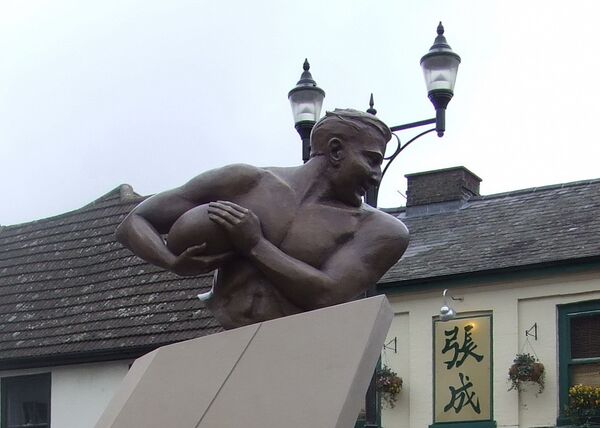English rugby's Russian invasion is stirring memories of the only Russian ever to play for England, who would have turned 96 on Friday.
As Russia's rugby stars take the game in the country to new heights with a successful World Cup debut that culminated in four members of the team representing English sides, the story of Prince Alexander Obolensky's remarkable life - and death - is coming back into focus.
Obolensky is remembered as the man who almost single-handedly smashed the New Zealand All Blacks in 1935 – the last time England beat the Kiwis until 1973.
He did so with a try that even by today’s professional standards was a thing of sublime beauty. Thankfully, the moment was captured on British Pathe News.
Some have noted that Obolensky, as a player, embodied a little of each of Russia's present-day Aviva Premiership quartet, with the rampaging speed of Northampton Saints wing Vasily Artemyev, the brute force of Sales Sharks lock Andrei Ostrikov, and the ball carrying skills of London Wasps pair Vladimir Korshunov and Victor Gresev.
Obolensky was born on February 17, 1916 in Petrograd, now St Petersburg, to aristocratic parents Prince Sergei and Princess Luba, just a year before the Russian Revolution swept their world.
The family fled as refugees in 1919 after the Civil War made it too dangerous to stay in Russia, and settled in London as refugees. The young Obolensky took up rugby at Trent College boarding school in Derbyshire in 1929 at the age of 13, and soon showed a talent for the game, leading his school to unprecedented success.
He went on to Brasenose College Oxford, and his gained his first Blue for the college side in 1935. A string of impressive displays earned him a call-up for England the following year.
His selection caused a lot of controversy, as he was technically still a Russian citizen. He made the team on condition of attaining British citizenship, which he had already applied for, and gained just weeks after playing in the famous All Blacks game. There was an awkward moment in the pre-match introductions to the teams, when King Edward asked “by what right do you play for England?”
“I attend Oxford University Sir,” he replied.
His crowning moment in the match remains one of the high points of English rugby. England were not expected to win the match, having never beaten New Zealand before. The nation was ecstatic. The Times described it as “a remarkable match, with a still more remarkable result.”
Obolensky scored two tries, the second of which is best remembered. He streaked across the field from the right wing to the left corner flag, the All Blacks defense trailing in his wake. England won 13-0.
A glorious future in rugby seemed certain, and the public grew increasingly enchanted with the young man with such an exotic background. Even the outbreak of war in 1939 did not put an end to his rugby – he was called up for service as a fighter pilot in the Royal Air Force, but played on in his spare time.
He showed that he had lost none of his skill with a flamboyant solo try against Wales in Cardiff in January 1940.
Obolensky’s life was cut short in March 1940, like so many young pilots that year.
While landing his Hawker Hurricane during training, the wheel of Obolensky’s aircraft hit a hole at the end of the runway and he was catapulted out of the cockpit. He was the first England rugby international to be killed in the conflict, aged just 24.
In 2009, a statue was unveiled in his memory in the eastern city of Ipswich, close to Martlesham Heath airfield, where he died.



